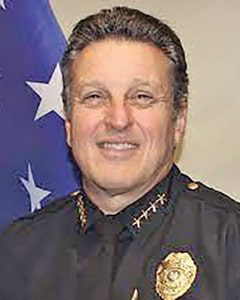|
Getting your Trinity Audio player ready...
|
 The radio call came in from dispatch as “341, unresponsive child, any available units respond.” The first officer arrived two minutes later. A distraught young woman thrust her lifeless infant son into the officer’s arms. “Make him breathe!” she screamed.
The radio call came in from dispatch as “341, unresponsive child, any available units respond.” The first officer arrived two minutes later. A distraught young woman thrust her lifeless infant son into the officer’s arms. “Make him breathe!” she screamed.
Later that night, the officer went home and gazed at his own young son, sleeping in his bed. The scene of that tragic evening has appeared in the officer’s dreams many times over the years.
That officer and many others are participating in a program called Struggle Well, an intensive seminar being offered by the Miami-Dade County Association of Chiefs of Police and Boulder Crest, a national nonprofit organization providing mental wellness care for military veterans and first responders struggling with consistent exposure to traumatic stress. Using lessons learned from Boulder Crest’s successful work with military veterans, Struggle Well helps first responders to thrive in the aftermath of professional and personal struggle.
“Police officers rarely ask for help with emotional issues, and when they do, it’s often very late in the game,” says Josh Goldberg, Executive Director of Boulder Crest. “The idea that you don’t talk about your struggles is pretty consistent among first responders. The culture dictates that you just suck it up and keep going. Struggle Well is focused on enabling first responders to talk about their struggles, so they transcend suffering and improve their lives. Police officers who are well, will police well,” he says.
Struggle Well kicked off in Miami-Dade County
During his 42 years in police work, South Miami Police Chief René Landa has seen the emotional toll that on-the-job trauma and personal issues at home can take on first responders. In 2021, just after taking over as President of the Miami-Dade County Association of Chiefs of Police, he connected with Boulder Crest’s Josh Goldberg and retired Miami-Dade County Police Chief Bernie Gonzalez. Together, they launched the country’s first Struggle Well class in Miami-Dade County in September of 2021. Since then, nearly 1,000 officers have been through the program across the country, learning the pillars of post-traumatic growth (PTG), a theory developed by psychologists Richard Tedeschi, PhD and Lawrence Calhoun, PhD in the mid-1990s. PTG holds that people who endure psychological struggle following adversity can often see positive growth afterward.
“We wanted to create an officer wellness program that would be available to every department in the county, focusing on the physical, emotional and spiritual wellbeing of officers,” says Chief Landa. “In addition to having all of society’s personal problems like divorces, family illnesses and deaths, cops have one of the most stressful jobs. Struggle Well allows officers to confide in their peers, the people they trust and rely on most. It’s remarkable how the officers are opening up to one another.”
Through a generous donation from AT&T’s FirstNet, the Struggle Well program is free of charge to departments. Each course runs five days every month and all 37 police chiefs in Miami-Dade County have committed to sending their officers, as well as dispatchers and senior staff members.
According to Goldberg, Struggle Well will soon be hosting programs in Arizona, Virginia, Oregon, Montana, Massachusetts and the Carolinas. Ultimately, the program will be available to the complete spectrum of first responders and frontline healthcare workers across the United States.
Longtime Miami officers involved Bernie Gonzalez, who retired after 26 years with the Miami-Dade County Police Department and 10 years with the State Department, coordinates the Struggle Well program in conjunction with Boulder Crest’s Josh Goldberg.
“Struggle is normal. We all struggle. What we’re doing with Struggle Well is helping officers to identify their own thoughts, feelings and actions and giving them tools to change their perspective,” says Gonzalez. “Peer-to-peer disclosure and discussion in a safe, trusting environment is the key…knowing that they are not alone in struggling, and then learning how to work through it and actually come out stronger on the other side.”
The South Florida Police Benevolent Association, headquartered in Doral, is completely supportive of the program. SFPBA President and Miami-Dade County Police Sergeant Steadman Stahl has provided training rooms and clerical support and actively spreads the word to the union members about the importance of Struggle Well.
“When an officer comes home and their spouse says ‘how was your day?’ the answer is usually ‘fine.’ And they may have been on the scene of the Surfside building collapse or been threatened by a man with a knife,” says Stahl. “Struggle Well teaches officers that it’s OK not to be OK, and that confiding in their peers can relieve the built-up pressure. It’s just the kind of program we need here and across the country.”
According to Chief Landa, the goal is for every officer in Miami-Dade County to go through Struggle Well training. Afterwards, those who wish to continue will have access to a dedicated Peer Support Team on a 24/7 basis, also made available through the partnership between Miami-Dade County Association of Chiefs of Police and Boulder Crest. There are also opportunities for officers to do more intensive peer-to-peer work at Boulder Crest’s Virginia and Arizona campuses, where group sessions are complemented by activities ranging from meditation to an equine-facilitated communications module.
“The biggest concern within the police community is their mental health,” says Goldberg.
“Yet society seems to accept that we’re going to let police officers do this dangerous work and, over time, their lives are going to get worse. That can’t be the bargain. They deserve far better. Struggle Well represents the essence of police reform — enabling officers to connect with themselves and de-escalate themselves, and thereby, de-escalate situations.”
For more information on Struggle Well, please visit www.strugglewell.com; to learn more about Boulder Crest, visit www.bouldercrest.org.





